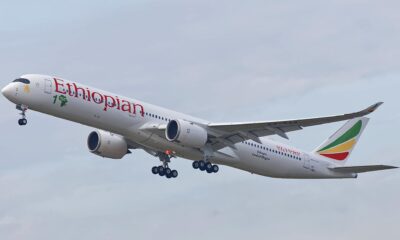Economy
Aircraft Manufacturers Jostle for African Market
Published
6 years agoon

- Aircraft Manufacturers Jostle for African Market
Major aircraft manufacturers – Boeing, Airbus, Bombardier, Embraer, ATR and others – are in fierce competition to have their aircraft types dominate the fleet of Nigerian and other African carriers, investigations have revealed.
The push for the dominance is coming on the heels of market survey studies, which revealed Africa as the new frontier market for the growth of global air transport.
Boeing, Airbus, Embraer and Bombardier’s surveys indicate the demand for their aircraft types in Africa as the next destination for growth.
Besides the reports, many African countries, including Nigeria, have opened discussions with some aircraft manufacturers to acquire their aircraft for either their national or flag carriers.
Investigations revealed that many African governments are about sealing their aircraft acquisition deals with Boeing Corporation, Airbus Company, Bombardier Commercial Aircraft Company and Brazilian aircraft maker – Embaer.
To confirm its interest in Nigeria as well as West and Central Africa, Boeing Corporation last year signed an agreement with Spring Fountain Infrastructure Limited to set up an aircraft company to facilitate airplane acquisition for carriers.
Part of the move, investigations revealed, was to encourage Nigerian and other African carriers to replace their ageing aircraft with state-of-the-art Boeing equipment that are environment-friendly and fuel efficient.
According to the project’s promoter, Mrs Tokunbo Fagbemi, this would boost Boeing Corporation’s inroads into Africa.
This move lauded by many operators, including Chairman of Air Peace, Mr Allen Onyema, has seen the airline acquiring more aircraft.
Though Boeing aircraft consists of over 60 per cent of the fleet in the airspace by indigenous carriers, others exist.
Air Peace, for instance, has acquired some Embraer jets. The aircraft, experts say, are good for short haul flights.
It was learnt that the Brazilian aircraft manufacturer is making inroads into the Nigerian and African markets as more operators are embracing the fleet because of its fuel economy, limited crew and lower maintenance cost.
In a recent interview in Lagos, Tropical cal Arctic Logistics Limited (TAL) President and Chief Executive Officer, Emperor Baywood Ibe, advised operators to consider Embaear regional and business jets as the most suitable aircraft for short haul flights.
The helicopter operator, who plans to launch scheduled domestic flights soon, said the company will settle for Embraer jets.
Also, in a recent interview, Minister of State, Aviation, Hadi Sirika confirmed that the government was discussing with some aircraft manufacturers to acquire airplanes for the proposed national carrier – Nigeria Air.
Investigations reveal that besides Boeing and Embraer aircraft types, many Nigetian carriers, including Arik Air, Aero Airlines and Overland Airways, have many Bombardier and ATR aircraft in their fleet.
While Overland Airways has ATR 72 aircraft type in its fleet, Aero and Arik Air have some Bombardier CRJ and Dash 8 Bombardier jets in their fleet.
Meanwhile, Canadian airplane manufacturer, Bombardier Commercial Aircraft, said three of it turboprops has been acquired by a Ghanaian operator – Passion Air.
The airline has become the first Bombardier operator in Ghana.
The aircraft manufacturer said the company placed three pre-owned Q400 turboprops.
The airline acquired the aircraft through a dry-lease with a third party.
“Bombardier has sold about 3,500 new regional aircraft to date, and we continue to be very active on the used aircraft market,” said David Speirs, Vice President, Asset Management, Bombardier Commercial Aircraft.
“Our recent momentum on the pre-owned aircraft market worldwide is a clear indication that our products are addressing a growing need for regional air transportation, especially in emerging markets.
“Our market penetration in Africa continues to intensify, and we are pleased to welcome Passion Air as the first commercial airline operating a Bombardier regional aircraft in the Republic of Ghana,” said Jean-Paul Boutibou, Vice President, Sales, Middle East and Africa, Bombardier Commercial Aircraft.
“Africa is the youngest and fastest growing region in the world, and regional aircraft like the Q400 will play a key role in helping advancing Africa’s economic growth.
The airline will operate the three Q400 aircraft in a 78-seat configuration on domestic routes.
“This is a first step, and we look forward to expanding our fleet with more Bombardier aircraft,” said Edward Annan, Chief Executive Officer, PassionAir.
Only last month, Bombardier Commercial Aircraft announced that it has signed a firm order for four new CRJ900 regional jets with Uganda National Airlines Company.
Based on the list price for the CRJ900 aircraft, the firm order is valued at $190 million.
“We congratulate the Government of Uganda on the revival of its national flag carrier, and are thrilled that the new airline has selected Bombardier and the CRJ900 regional jets for its upcoming debut,” said Jean-Paul Boutibou, Vice President, Sales, Middle-East and Africa, Bombardier Commercial Aircraft.
Investigations reveal that 21 operators are flying 58 CRJ Series in Africa. Bombardier has recorded firm orders for 1957 CRJ Series regional jets.
A recent batch of acquisitions by African carriers boosted Bombardier’s presence on the continent.
“As we seek to increase our market share on the continent, we have successfully placed a significant number of pre-owned regional aircraft with more than seven airlines from the region in the last three months,” Boutibou said.
Among African carriers that have acquired Bombardier aircraft are South Africa’s CemAir, Tunisian Syphax, Cameroon’s CamAir – Company, Kenya’s DAC East Africa and Congo Airways.
Others are: Kenya’s 784 Air Services and Silverstone Airways.
“Our market penetration in Africa is making headway,” Boutibou said at the African Aviation Finance conference in Johannesburg, South Africa
“Our strategy not only further supports our aftermarket revenue stream, we are confident that it will also lead to new aircraft orders in the future,” he added.
“These latest placements in Africa are testament to the residual value of our regional aircraft,” Bombardier Commercial Aircraft Vice President, Asset Management, David Speirs said
Africa’s fast growing carrier, Ethiopian Airlines, has signed a purchase agreement with Bombardier for 10 new Q400 aircraft.
“The Bombardier turboprops continue to deliver unmatched performance to our operators, and we are proud that the flag carrier of Ethiopia is once again recognising its tremendous value by increasing its fleet of Q400 aircraft,” said Fred Cromer, President, and Bombardier Commercial Aircraft.
Is the CEO and Founder of Investors King Limited. He is a seasoned foreign exchange research analyst and a published author on Yahoo Finance, Business Insider, Nasdaq, Entrepreneur.com, Investorplace, and other prominent platforms. With over two decades of experience in global financial markets, Olukoya is well-recognized in the industry.

You may like
-


Dangote Refinery Launches First PMS Export to Cameroon in Historic Partnership with Neptune Oil
-


Ghana’s President, John Mahama Unveils Plans For Citizens After Victory
-


AFDB Urges African Countries To Adopt Homegrown Strategy To Tackle Economic Challenges
-


Ethiopian Airlines Welcomes Africa’s First A350-1000 Aircraft
-


Outrage in Equatorial Guinea: Government Restricts WhatsApp Multimedia Sharing Amid Scandal
-


Leading African Fund Managers Will Gather for the Third Time at Oxford’s Saïd Business School to boost Africa’s rising tech potential









